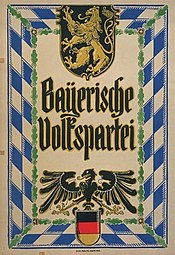
Back حزب الشعب البافاري Arabic حزب الشعب البافارى ARZ Баварская народная партыя Byelorussian Partit Popular de Baviera Catalan Bavorská lidová strana Czech Bayerische Volkspartei German Partido Popular Bávaro Spanish Baijerin kansanpuolue Finnish Parti populaire bavarois French Bajor Néppárt Hungarian
Bavarian People's Party Bayerische Volkspartei | |
|---|---|
 | |
| President(s) | Karl Speck (1918–1929) Fritz Schäffer (1929–1933) |
| Founded | November 1918 |
| Dissolved | 4 July 1933 |
| Split from | Centre Party |
| Succeeded by | Christian Social Union in Bavaria, Bavaria Party (not legal successors) |
| Headquarters | Munich, Germany |
| Paramilitary wing | Bayernwacht |
| Ideology | Political Catholicism Bavarian regionalism Christian democracy Conservatism (German)[1] |
| Political position | Centre-right[2] |
| Religion | Roman Catholicism |
| Colours | Cyan White |
| Party flag | |
 | |
The Bavarian People's Party (German: Bayerische Volkspartei; BVP) was a Catholic political party in Bavaria during the Weimar Republic. After the collapse of the German Empire in 1918, it split away from the national-level Catholic Centre Party and formed the BVP in order to pursue a more conservative and particularist Bavarian course.[3] It consistently had more seats in the Bavarian state parliament than any other party and provided all Bavarian minister presidents from 1920 on. In the national Reichstag it remained a minor player with only about three percent of total votes in all elections. The BVP disbanded shortly after the Nazi seizure of power in early 1933.
- ^ Stibbe, Matthew (2010). Germany, 1914–1933: Politics, Society and Culture. Pearson Education. p. 79.
- ^ Stibbe, Matthew (2010). Germany, 1914-1933: Politics, Society and Culture. Pearson Education. p. 59.
- ^ "Bayerische Volkspartei (BVP)". Deutsches Historisches Museum (in German). 17 September 2014. Retrieved 17 January 2023.